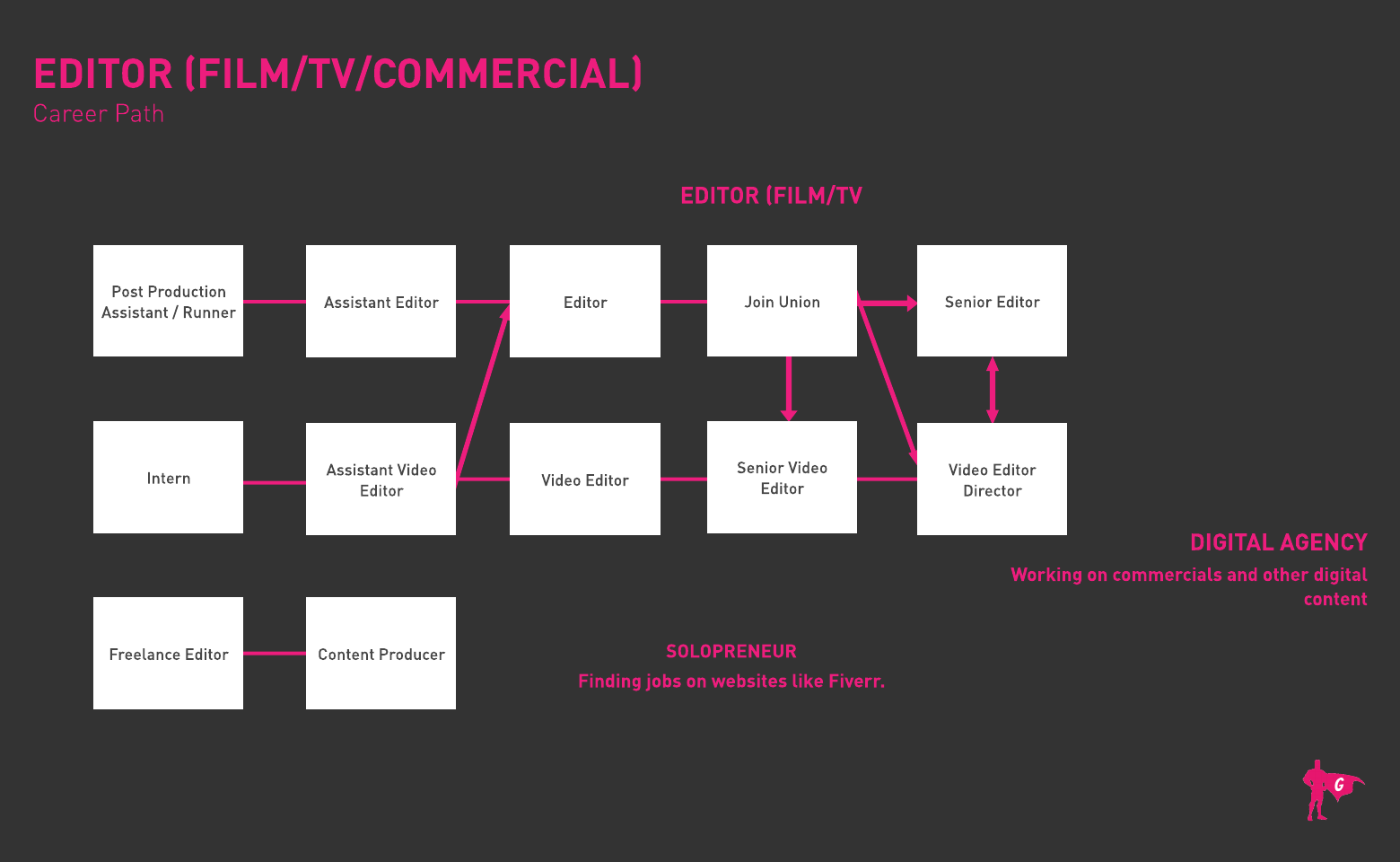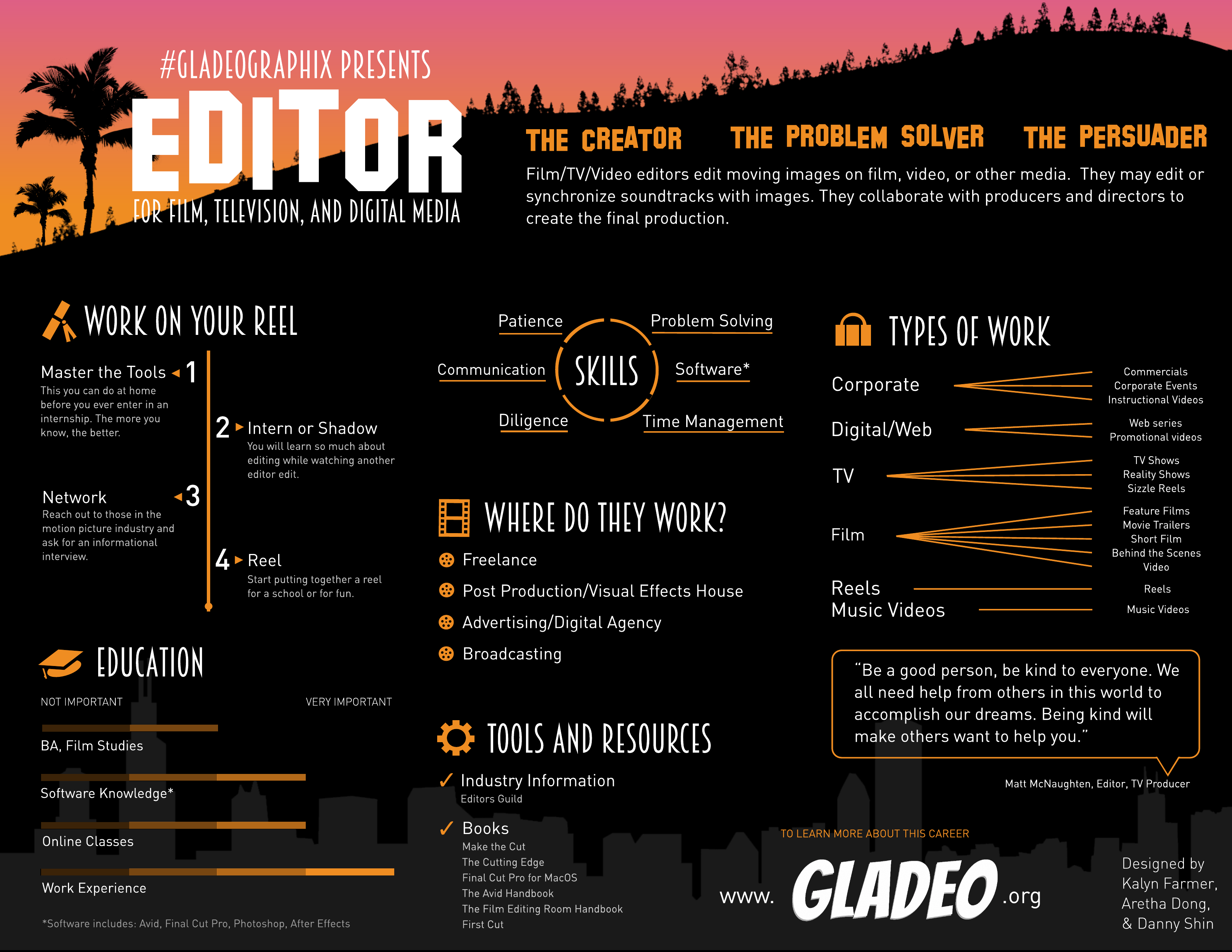Focos
Editor, editor de cine, editor de noticias, editor de vídeos de noticias, editor de cintas de vídeo de noticias, editor no lineal, editor en línea, editor de cintas, editor de vídeos de noticias televisivas, editor de vídeos.
Los editores de cine, televisión y vídeo editan imágenes en movimiento en películas, vídeos u otros medios. Pueden editar o sincronizar bandas sonoras con imágenes. Colaboran con productores y directores para crear la producción final.
Nota: Este perfil está dirigido a aquellas personas que desean trabajar en la industria cinematográfica en Los Ángeles o Nueva York. No se centra en la profesión de editor en el ámbito de la radiodifusión.
- ¡Siempre aprendiendo cosas nuevas!
- ¡Trabajando con artistas y gente creativa!
«Editar televisión y vídeo es algo que siempre quise hacer, y lo hacía por diversión cuando era niño. Así que ahora es como si me pagaran por hacer algo que siempre ha sido mi hobby. Por eso, en realidad no lo siento como un trabajo». MattMcNaughten, editor y productor de televisión.
- Técnico: Avid, Final Cut Pro, Photoshop, After Effects
- Habilidades comunicativas
- Gestión del tiempo
- Resolución de problemas
- Paciencia
- Diligencia
- Autónomos: La mayoría de los editores en la industria cinematográfica son autónomos y trabajan por proyectos.
- Postproducción/Estudio de efectos visuales
- Agencia de publicidad/digital
- Radiodifusión: Medios de comunicación
- Película: Largometrajes, tráilers, cortometrajes, vídeos detrás de las cámaras.
- Televisión: programas de televisión, reality shows, avances promocionales.
- Vídeos musicales
- Corporativo: Anuncios publicitarios, eventos corporativos, vídeos instructivos.
- Digital/Web: Series web, vídeos promocionales
- Otros: Reels de actores
Si tu sueño es ser editor de cine, ten en cuenta que lo más probable es que no consigas un puesto de editor de cine desde el principio. Muchos editores realizan otros trabajos (para empresas, vídeos musicales, digitales) para pagar sus facturas y esperar su oportunidad en la edición de cine. A menos que seas un editor famoso, los trabajos de edición de cine y televisión son escasos y poco frecuentes. Sé flexible. Los otros trabajos te permitirán perfeccionar tu oficio, prepararte para cuando te llamen para editar un largometraje o un programa de televisión y pagar las facturas.
- Jornadas laborales largas y horarios irregulares.
- Es difícil entrar en el sector y permanecer en él: los salarios son bajos al principio.
- Trabajar solo durante muchas horas en una habitación oscura.
A medida que los vídeos online ganen popularidad, habrá más trabajo para los editores en el ámbito digital.
- ¡Me encantaban el cine y la televisión!
- Me encantaba editar vídeos: hoy en día se pueden editar vídeos con programas gratuitos en línea. La tecnología ha avanzado tanto que casi cualquier persona que tenga acceso a un ordenador puede editar vídeos.
- ¡Quería formar parte del proceso narrativo!
- Eras la persona a la que acudían en tu familia para editar los vídeos caseros.
- ¡Me encantaban los rompecabezas y los juegos!
- 2575,88 dólares por semana (sindicato)
- Los editores de cine, televisión y medios digitales deben tener una licenciatura en Estudios de Cine y Televisión o algo similar. Algunos completan un programa de Maestría en Bellas Artes, pero la EXPERIENCIA es más importante que la educación.
- O bien, toma clases de edición y cine y especialízate en otra materia que te interese. La edición es un proceso creativo. Cuanta más experiencia y conocimientos tengas del mundo, más creativo serás y mejor editor serás.
- Los editores de cine que trabajan en pequeñas películas independientes no tienen requisitos educativos formales, pero muchos también tienen títulos universitarios o han asistido a cursos de formación reglada.
- Las escuelas de cine, como la New York Film Academy, ofrecen programas cortos y programas completos para obtener un título (consulte nuestra lista de Recursos > Escuelas de cine).
- Los editores de cine, televisión y medios digitales deben estar familiarizados con programas de edición populares como Adobe Premiere Pro, Avid Media Composer, Final Cut Pro, DaVinci Resolve 17, Vegas Pro, Autodesk Maya, FUSION 17, The Foundry Nuke, Lightworks, ZBrush, Houdini, Boris FX Mocha Pro, RenderMan de Pixar, Modo y After Effects.
- También deben tener sólidas habilidades organizativas y narrativas.
- Muchos estudiantes adquieren experiencia práctica a través de prácticas o aprendizajes en estudios, pequeñas productoras, consejos cinematográficos, organizaciones sin ánimo de lucro o gremios y sindicatos de producción.
- Las certificaciones ad hoc adicionales pueden ayudarte a reforzar tus credenciales, como el certificado de edición cinematográfica de UCLA Extension.
- Apúntate a cursos de arte, inglés, escritura, diseño y fotografía.
-
Únete a clubes audiovisuales para adquirir experiencia práctica.
Ve una variedad de tipos de producciones, incluyendo películas, programas de televisión, anuncios publicitarios, etc., y presta atención a cómo se editan las escenas y cómo funcionan los elementos visuales narrativos.
Aprende a leer y visualizar las indicaciones escénicas en los guiones cinematográficos.
Empieza a editar tus cortometrajes para YouTube o Vimeo. ¡Busca amigos y miembros de la comunidad que quieran unirse a tus proyectos!
- ¡Domina las herramientas!Esto lo puedes hacer en casa antes de empezar las prácticas. Cuanto más sepas, más impresionarás.
- Software principal: Avid, Final Cut Pro
- Software secundario: Photoshop, After Effects
- Aprende todos los atajos de teclado. Aprende a organizar contenedores, trabajar con multiclips y sincronizar sonido. Necesitarás saber cómo hacer estas cosas más adelante, cuando te conviertas en asistente de edición.
- Hacer prácticas o acompañar a un editor: Probablemente será una pasantía no remunerada, pero esta experiencia es invaluable. Aprenderás mucho sobre edición mientras observas a otro editor trabajar. No solo aprenderás los aspectos técnicos, sino también más sobre la industria.
- Recomendación: elige una universidad cercana a Los Ángeles o Nueva York para que puedas realizar prácticas mientras estudias o durante los veranos. Cuanto más cerca estés de esas ciudades, más cerca estarás de las personas que pueden ofrecerte tus primeras prácticas, tu primera oportunidad o tu primer trabajo.
- Edita vídeos gratis en tu instituto, universidad, hermandad, organización sin ánimo de lucro, videoclip para la banda de tus amigos... donde sea que puedas.
- Reel: empieza a crear un reel.
- Anuncia tus servicios de edición de vídeo en tu zona o a través de plataformas online para autónomos.
- Asiste a festivales de cine y eventos abiertos de escuelas de cine.
- Sigue perfeccionando tus habilidades y revisando los cambios en tecnología y técnicas.
- Intenta establecer tantos contactos en el sector como puedas mediante una red de contactos constante.
- ¡Sigue intentándolo y sigue solicitando prácticas de edición de cine hasta que consigas una!
- Estudia libros, artículos y tutoriales en vídeo sobre edición de cine y televisión (consulta nuestra lista de Recursos > Sitios web).
- Vea entrevistas en vídeo con editores de cine experimentados.
- Trabaja con cineastas independientes en proyectos más pequeños. ¡Ofrece tus servicios como voluntario si no tienen presupuesto para pagarte!
- Únete a organizaciones profesionales para ampliar tu red de contactos mientras aprendes y construyes tu reputación.
- 9,6 % con HSDiploma
- 8,5 % con título de asociado
- 49,5 % con licenciatura
- 6,1 % con máster
- 0,7 % con Professional
(Porcentaje de empleados de entre 25 y 44 años en la ocupación cuyo nivel educativo más alto es)
- Instituto Americano de Cine
- Facultad de Comunicación de la Universidad de Boston
- Facultad Dodge de Cine y Artes Audiovisuales de la Universidad Chapman
- Facultad de Artes de la Universidad de Columbia
- Facultad de Artes Cinematográficas de la Universidad Estatal de Florida
- Universidad Full Sail
- Escuela de Cine de Los Ángeles
- Escuela de Cine y Televisión de la Universidad Loyola Marymount
- Instituto Cinematográfico de Michigan
- Academia de Cine de Nueva York
- Escuela de Artes Tisch de la Universidad de Nueva York
- Escuela de Teatro, Televisión y Cine de la Universidad Estatal de San Diego
- Instituto de Cine de Seattle
- Escuela de Teatro, Cine y Televisión de la UCLA
- Extensión de UCLA - Estudios del entretenimiento
- Escuela de Artes Cinematográficas de la USC
- Universidad de Nueva Orleans Cine y Teatro
- Universidad de Texas en Austin, Departamento de Radio, Televisión y Cine

- Conoce tus herramientas: Avid, Final Cut Pro, Photoshop, After Effects.
- Reel: Reúne un reel con las cosas que has hecho. No lo hagas demasiado largo.
- Mudarse a Los Ángeles/Nueva York: Esto se aplica a aquellos que desean trabajar en la industria cinematográfica.
- Red
- Sala de editores http://www.editorslounge.com/index.html
- Grupo de usuarios de LA Creative Pro http://www.lafcpug.org/user_schedule.html
- LA Post Production Group http://www.lafcpug.org/user_schedule.htm
- Becario (normalmente sin remuneración): si no estás dispuesto a trabajar gratis, esta no es la carrera adecuada para ti.
- Bolsas de trabajo: Reality Staff, Entertainment Careers, Mandy realitystaff.com, entertainmentcareers.net y mandy.com.
- Programas de prácticas: Programa de prácticas de A.C.E. http://ace-filmeditors.org/about-2/ace-intern-program/
- Haz muchas preguntas, pero no seas molesto.
- Ten una actitud servicial hacia tu supervisor y sé indispensable para él o ella.
- Solicita un puesto de trabajo en una empresa de posproducción o de efectos visuales.
- Esté dispuesto a empezar desde abajo: esto significa que servir café o hacer recados no está por debajo de su dignidad. Así es como la mayoría de las personas comienzan en la industria. Si esto es algo que no está dispuesto a hacer, entonces no espere trabajar en proyectos importantes en Hollywood o Nueva York. Limítese a los cortometrajes digitales, los vídeos promocionales y los vídeos industriales.
- Tu primer trabajo remunerado probablemente será como ayudante, recadero o asistente de edición, y luego podrás ir ascendiendo.
- Resistencia
- Perseverancia: llamarás a muchas puertas y no obtendrás respuestas o recibirás rechazos. Solo los fuertes y persistentes no solo sobreviven, sino que se abren paso en la industria.
- Pasión: al igual que muchas profesiones en la industria del entretenimiento, solo aquellos que están entusiasmados con seguir la carrera sobreviven.
- Capacidad para establecer contactos y relacionarse con otras personas.
- Disponibilidad para trasladarse a Los Ángeles o Nueva York.
- Sin complejo de superioridad: hay miles de personas que harían este trabajo gratis, así que no esperes que te regalen nada.
Casi todas las grandes producciones cinematográficas y series de televisión con guion requieren que seas miembro del Sindicato de Editores de Cine para poder trabajar en ellas. Por lo tanto, tendrás que conseguir entrar en el sindicato.
- Acumular 100 días remunerados de trabajo como asistente de edición no sindicalizado en proyectos similares a los trabajos sindicalizados. Para obtener más información, visite el sitio web del Sindicato de Editores de Cine.
- Los reality shows, los documentales y las películas independientes son tu mejor opción para acumular puntos estos días.
- Guarda todos los recibos de sueldo de estos trabajos y asegúrate de que en ellos figure la denominación «editor asistente».
- Se tarda entre 5 y 10 años de media en pasar de asistente no sindicalizado a editor, así que asegúrate de estar comprometido.
¡Sí!
- Salario/Prestigio: Una gran película dirigida por un director famoso sería un avance con respecto a una película más pequeña y de bajo presupuesto. Tu salario aumentará en función del tamaño del presupuesto.
- Conviértete en productor/director de televisión: Muchas veces, los editores también pasan a ser productores o directores, si eso es algo que les interesa.
- Puntos de beneficio: Algunos editores también negocian «puntos» de beneficio en las películas, lo que significa que, dependiendo del éxito de taquilla de la película, el editor recibirá la compensación/porcentaje de beneficio negociado.
Sitios web
- Academia de Artes y Ciencias Cinematográficas
- Academia de Artes y Ciencias de la Televisión
- Editores de cine estadounidenses
- Instituto Americano de Cine
- Asociación de Cineastas y Videógrafos Independientes
- Sindicato de Directores de América
- EditFest
- Asociación Cinematográfica
- Sindicato de Editores de Cine
- Sociedad de Estudios Cinematográficos y Mediáticos
Libros
- El arte del montaje: Conversaciones con editores de cine y televisión, por Steve Hullfish
- Cutting Rhythms: Edición intuitiva de películas, por Karen Pearlman
- Teoría de la edición de cine y vídeo: cómo la edición crea significado, por Michael Frierson.
- En un abrir y cerrar de ojos: una perspectiva sobre la edición cinematográfica, por Walter Murch
- Sobre la edición cinematográfica: Introducción al arte de la construcción cinematográfica, por Edward Dmytryk
«Estate dispuesto a hacer cualquier cosa. Aprende a hacer de todo. Aunque un trabajo sea duro y no te paguen nada, aprende de él. Si sabes cómo ser editor, conseguirás trabajos de edición. Pero si aprendes todos los aspectos del negocio, te inicias en la escritura, la producción, la gestión, el trabajo con cámaras, Photoshop, Final Cut Pro, After Effects, la creación de contenidos, tendrás muchas más perspectivas de ganar dinero».
«Sé una buena persona, sé amable con todo el mundo. Todos necesitamos la ayuda de los demás en este mundo para cumplir nuestros sueños. Ser amable hará que los demás quieran ayudarte».Matt McNaughten, editor y productor de televisión.
Fuente de noticias

Empleos destacados

Cursos y herramientas en línea

Expectativas salariales anuales
Los nuevos trabajadores comienzan con un salario de alrededor de 79 000 dólares. El salario medio es de 105 000 dólares al año. Los trabajadores con mucha experiencia pueden ganar alrededor de 135 000 dólares.
Expectativas salariales anuales
Los nuevos trabajadores comienzan con un salario de alrededor de 53 000 dólares. El salario medio es de 68 000 dólares al año. Los trabajadores con mucha experiencia pueden ganar alrededor de 75 000 dólares.
Expectativas salariales anuales
Los nuevos trabajadores comienzan con un salario de alrededor de 57 000 dólares. El salario medio es de 75 000 dólares al año. Los trabajadores con mucha experiencia pueden ganar alrededor de 103 000 dólares.
Expectativas salariales anuales
Los nuevos trabajadores comienzan con un salario de alrededor de 45 000 dólares. El salario medio es de 62 000 dólares al año. Los trabajadores con mucha experiencia pueden ganar alrededor de 80 000 dólares.








